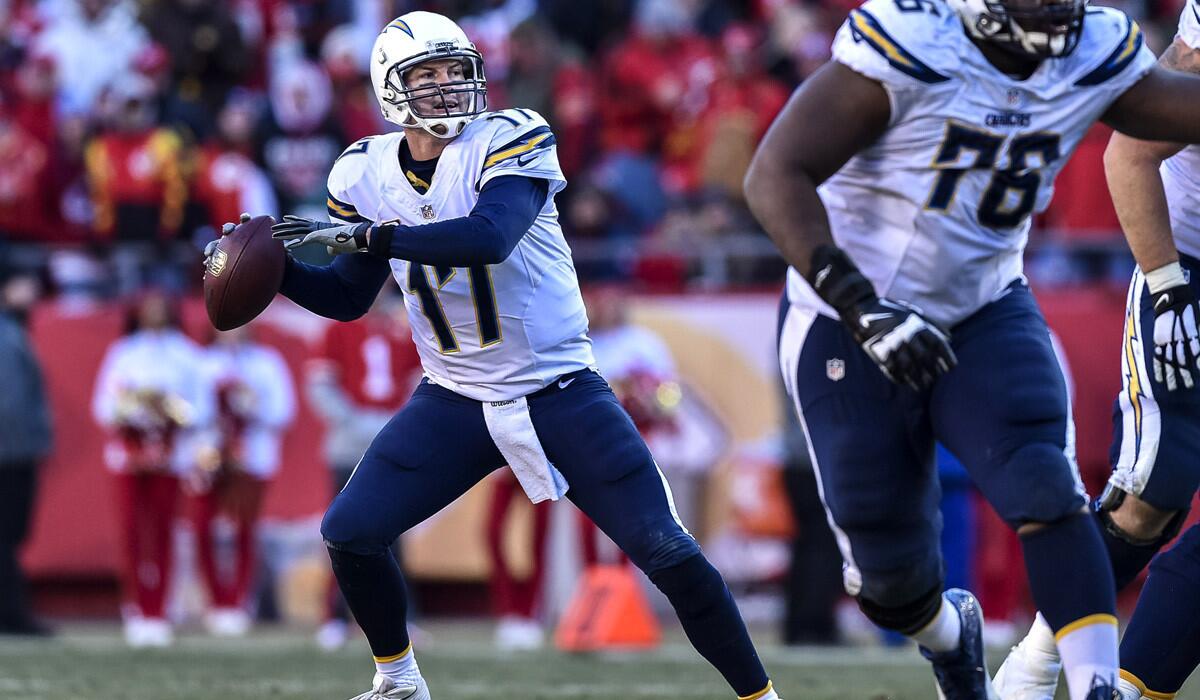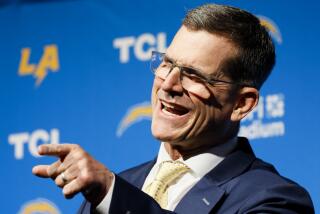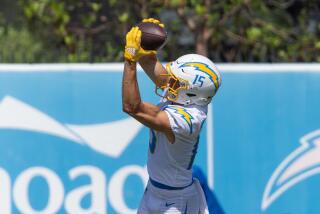As San Diego Chargers seek to resolve stadium issue, tension rises

- Share via
The San Diego Chargers can hear the clock ticking, and they don’t have the luxury of time.
With the St. Louis Rams mulling a relocation to Southern California, the Chargers are turning up the heat on the city of San Diego to determine whether they can finally get a new stadium in that city, or if they too need to make a play for Los Angeles.
Tensions flared Tuesday when Chargers special counsel Mark Fabiani wrote a letter to San Diego Mayor Kevin Faulconer that essentially questioned the seriousness and effectiveness of yet another stadium task force, and the mayor answered with a letter questioning the helpfulness of Fabiani’s critique.
“His divisive tone and criticism of this group of volunteers, civic leaders and the city of San Diego as a whole are not conducive to developing a plan for a new stadium,” Faulconer wrote. “I hope his behavior is not indicative of our ability to find a solution.”
The Chargers have made no secret of their disappointment in the mayor’s forming a task force to address an issue they have been working on for almost 14 years. They met with Faulconer in November and tried to convince him to appoint a stadium czar who could work directly with team executives on finding an eventual replacement for aging Qualcomm Stadium.
Instead, the mayor appointed a task force, which the Chargers argue has no resources or authority to get anything done. Their position is that such an advisory group only allows the mayor to kick the can down the road and not deal with the problem at hand.
“Simply put, we have no intention of allowing the Chargers franchise to be manipulated for political cover,” Fabiani told the task force in a letter Monday, “and we will call out any elected official who tries to do so.”
In voicing their displeasure, the Chargers are talking not just to the mayor and city. More important, they are talking to the owners of the NFL’s 31 other teams, trying to underscore the effort they have made to find a solution in San Diego and how difficult that process has been.
Convincing the other owners of that is essential, because the NFL is intent on exerting its control of the L.A. market — including which team or teams can move there, and where a new stadium would be located. How much control the league has in those matters is up for debate.
But the Chargers are trying to play by the league’s rules to send the message that if it comes to a team moving back to the nation’s second-largest market, they have fulfilled their relocation requirements and have done so by the book. Then, if it comes to a vote of owners, that presumably will weigh in their favor.
What Fabiani specifically questioned the mayor on Tuesday was whether the task force was truly independent of political influence. Fabiani asked why a political consultant to Faulconer, Jason Roe, attended a task force meeting that was closed to the media and the public. Fabiani also noted Roe is a lobbyist for a firm bidding to be a concessionaire at Qualcomm Stadium.
“Putting the legal and ethical issues aside for a moment,” Fabiani wrote, “what sense does it make to have someone who is your chief advisor on political matters, and who advises a potential stadium vendor on business matters, play any sort of role with the ‘independent’ task force?”
The gist of Fabiani’s question: Does the task force truly represent a good-faith effort to find a stadium solution, or is it an effort to continue to run out the clock on the problem?
Roe answered in a written statement that made reference to the Chargers’ drafting a quarterback in what turned out to be one of the biggest flops in NFL history.
“Ryan Leaf is no longer the worst personnel decision in Chargers history,” Roe responded. “In 14 years of failure, Mark Fabiani has done nothing but make excuses, lay blame, and pick fights. The mayor’s advisory committee is just that — the mayor’s advisory committee, and Mark does not get to dictate how the mayor organizes his advisory group.”
Beyond the bickering is this undeniable truth: The pressure is rising in San Diego, and the Chargers are getting nervous and restless about protecting what they believe is their turf.
At some point soon, they might feel the need to take the next step. And that could be a step north.
Twitter: @LATimesfarmer
Times staff writer Tony Perry contributed to this report.
More to Read
Go beyond the scoreboard
Get the latest on L.A.'s teams in the daily Sports Report newsletter.
You may occasionally receive promotional content from the Los Angeles Times.











